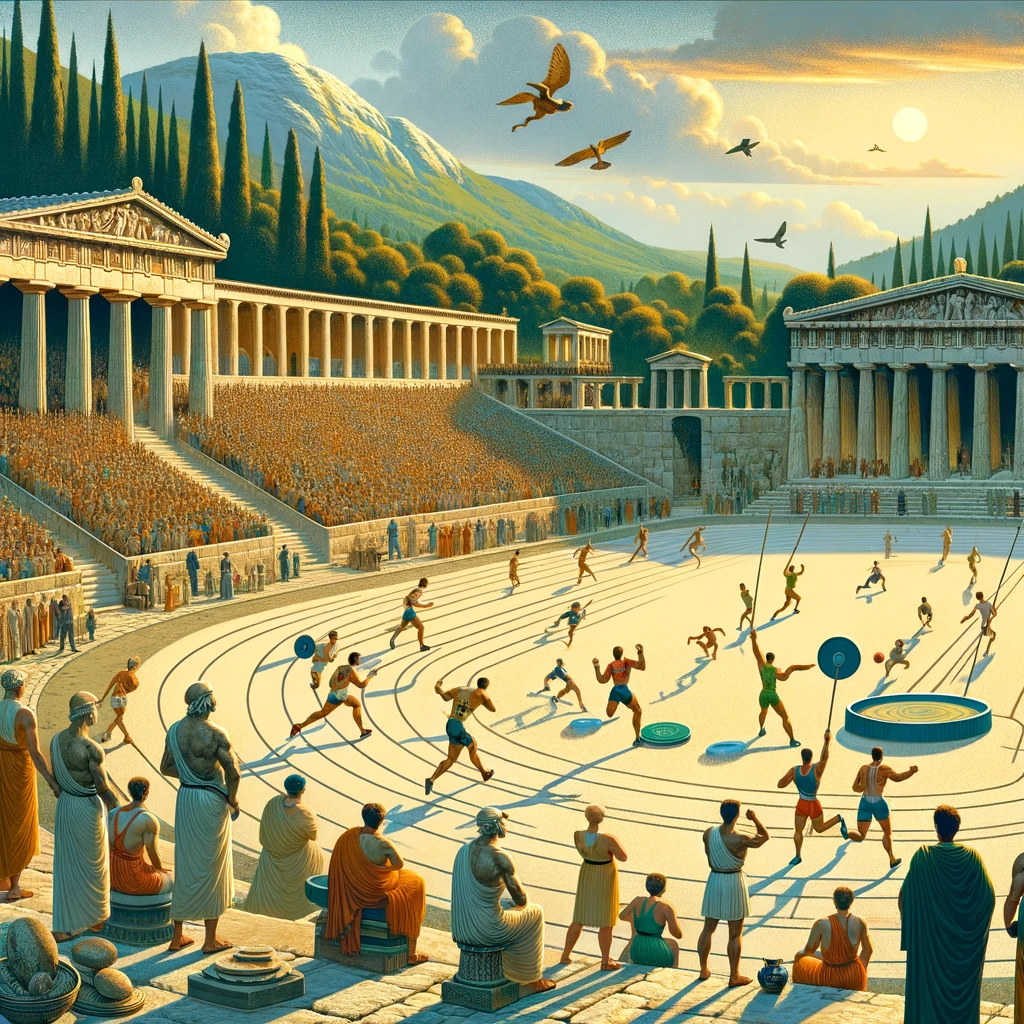The Olympic Games, originating in ancient Greece, stand as a monumental legacy in both the history of athletics and the cultural tapestry of the world. Initiated in 776 BC in Olympia, these games were more than just a showcase of physical prowess and competitive spirit; they were a deeply rooted religious and cultural festival that honored Zeus, the king of the Greek gods. This quadrennial festival drew participants and spectators from the various city-states and kingdoms of ancient Greece, transcending the usual conflicts and rivalries to celebrate unity, excellence, and shared heritage.
The significance of the Olympic Games in ancient Greece cannot be overstated. They were a pivotal element of Greek identity, promoting values of fair play, honor, and peace among competitors. Athletes, competing naked to demonstrate their physical prowess and to pay homage to the gods, participated in a variety of events that tested their skills to the limits. Victors were celebrated with laurels, immense prestige, and often lifetime privileges, highlighting the games’ role not just in sports but in societal status and honor.
Moreover, these games underscored the cultural and religious importance of communal gatherings in ancient Greece. They were accompanied by artistic performances, literary contests, and sumptuous feasts, making them a comprehensive cultural event. The Olympic Games served as a unifying force, pausing conflicts through the sacred Olympic truce and allowing for peaceful competition and exchange between the diverse Greek polities. This tradition of peace, excellence, and unity laid the foundation for the Olympic Games’ enduring legacy, influencing countless generations and the modern Olympic movement.
The Origin and History of the Olympic Games
The Mythological Beginnings
According to legend, the Olympic Games were inaugurated by Hercules, the son of Zeus, following his completion of the twelve labors. Hercules dedicated the games to Zeus, marking the valley of Olympia as a sacred site for the competition. This mythological origin imbues the games with a sense of divine approval and connection to the gods, particularly Zeus, to whom the sanctuary at Olympia was dedicated. The religious undertones of the games were profound, with athletes competing not just for personal glory but to honor the gods. Olympia became a site for worship, with majestic temples and altars, where rituals and sacrifices were made to Zeus, reinforcing the games’ status as a religious festival.
The Timeline of the Games
The first recorded Olympic Games took place in 776 BC, and they were held every four years thereafter, a period known as an Olympiad. This timeline was so significant that it became a method for keeping historical records, with events often dated by the Olympiad in which they occurred. Over the centuries, the games evolved and expanded, adding events and attracting athletes from all corners of the Greek world. The games played a crucial role in fostering a Panhellenic (all-Greek) identity, serving as a powerful unifying force among the city-states. Despite ongoing conflicts and rivalries, the Olympic truce was observed, allowing athletes and spectators safe passage to and from Olympia. This period of peace underscored the games’ importance in promoting unity and commonality among the diverse Greek polities, transcending political and social divisions. The Olympic Games, through their celebration of athletic excellence, religious devotion, and communal identity, became one of the most enduring legacies of ancient Greece, reflecting the values and aspirations of its people.
The Events and Athletes of Ancient Olympia
The Main Events
The Olympic Games in ancient Greece showcased a wide array of sports, each designed to test the physical abilities and courage of its participants. The main events included:
- Running: Athletes competed in various distances, from the short sprint (stadion) to the long-distance run (dolichos).
- Wrestling: This sport tested strength and technique, with victory achieved by forcing an opponent to the ground.
- Boxing: Ancient boxing was a brutal test of endurance and power, with fighters wrapping their hands in leather straps for protection.
- Pankration: A no-holds-barred blend of boxing and wrestling, pankration was perhaps the most grueling of all ancient Olympic sports.
- Chariot Racing: Conducted in the hippodrome, chariot racing was a spectacular and dangerous event, showcasing both the skill of the charioteers and the speed of their horses.
The Pentathlon, considered the ultimate test of versatility and skill, combined five events: a foot race, long jump, discus throw, javelin throw, and wrestling. Excelling in the Pentathlon required an athlete to be not just specialized in one area but proficient in a range of athletic disciplines.
Famous Athletes and Their Legacies
Several athletes from ancient Olympia left enduring legacies through their extraordinary achievements:
-
Kallipateira of Rhodes: Known for breaking the ban on female spectators by sneaking into the stadium to watch her son compete—and win. Her actions challenged the gender norms of the time and led to changes in Olympic rules.
- Melankomas of Caria: Celebrated for his exceptional skill in boxing and his unbeaten record, Melankomas also gained fame for his endurance and aesthetic style of fighting.
The concept of Olympic glory was profound, with victors celebrated as heroes and often immortalized in statues and poetry. Their success brought honor not just to themselves but to their city-states, and many athletes were rewarded with lifelong privileges.
The Cultural and Political Impact
The Olympic Games as a Unifying Force
The Olympic Games played a crucial role in fostering a Panhellenic identity, creating a sense of shared heritage and purpose among the Greek city-states. This unity was particularly evident during the Olympic truce, a period of peace that allowed athletes and spectators to travel safely to Olympia. The truce demonstrated the games’ power to transcend political and military conflicts, emphasizing commonalities over differences.
The Games of Hera and Women in the Olympics
While the main Olympic Games were restricted to male athletes, ancient Olympia also hosted the Heraean Games, a series of athletic competitions for women. Named after Hera, the wife of Zeus, these games included running races for maidens and married women. The inclusion of the Heraean Games highlighted the evolving role of women in Greek society and provided a platform for female athletic achievement, albeit on a smaller scale than their male counterparts.
The Olympic Games, through their cultural and political impact, not only united the Greek world but also laid the foundation for the modern Olympic movement, embodying ideals of peace, excellence, and mutual respect that resonate to this day.
Comparing Ancient and Modern Olympics
Similarities and Differences
The Olympic Games have undergone a remarkable evolution from their ancient origins to the global spectacle of the modern era. Despite the passage of millennia, the core ethos of the Olympics—celebrating human excellence, fostering peace, and bringing diverse peoples together—remains intact. Both ancient and modern Olympics serve as a stage for athletes from various backgrounds to showcase their abilities and strive for greatness.
Similarities include:
- The Olympic Creed and Motto, emphasizing participation, personal excellence, and the pursuit of excellence, reflect ideals that were celebrated in ancient times.
- The concept of the Olympic Truce, originating in ancient Greece, has a modern counterpart in the calls for peace during the Games, highlighting the event’s role as a unifying force beyond sports.
- The diverse range of sports, with athletics (track and field) maintaining a central place in both ancient and modern times, demonstrates a continuous appreciation for physical prowess and skill.
Differences are evident in:
- The scale and scope of the Games, which have expanded from a regional event to a global phenomenon, incorporating athletes from over 200 nations.
- The inclusion of women in all events, reflecting modern values of gender equality, contrasts sharply with ancient practices where women’s participation was severely restricted or relegated to separate games (the Heraean Games).
- The commercialization and media coverage of the modern Olympics, bringing unparalleled attention and resources to the Games, diverge from the more localized, religious, and cultural focus of their ancient counterparts.
The Legacy of the Ancient Games
The ancient Olympic Games have left an indelible mark on modern sports competitions and the Olympic movement. Their legacy is evident in:
- The revival of the Olympics in 1896, inspired by the ideals and traditions of the ancient Games, aiming to promote peace and understanding across cultures through sports.
- The enduring symbols of the Olympics, such as the torch relay and the rings, symbolize the connection between the ancient and modern Games and the universal values they represent.
- The emphasis on sportsmanship, excellence, and the educational value of sports, echoing the ancient Greeks’ appreciation for the development of both body and mind.
The influence of the ancient Olympics extends beyond the realm of sports, impacting how societies view competition, achievement, and international cooperation. By honoring the legacy of the ancient Games, the modern Olympic movement continues to aspire towards a harmonious and peaceful world, united through the shared language of sport.
Conclusion
The Olympic Games of ancient Greece have bequeathed an enduring legacy that transcends mere athletic competition. They fostered values of excellence, honor, and peace, uniting diverse Greek city-states in a celebration of human potential and divine reverence. The revival of the Olympics in the modern era, inspired by the ancient traditions, underscores the timeless appeal and universal relevance of these ideals. As we reflect on the cultural and historical significance of the ancient Games, their influence on the development of sports, international relations, and cultural exchange becomes evident. The ancient Olympics not only showcased athletic prowess but also promoted a shared human heritage, bridging the past and present in the ongoing quest for excellence and understanding among peoples of the world.
Frequently Asked Questions
Q: When did the ancient Olympic Games first start?
A: The ancient Olympic Games are traditionally dated to 776 BC.
Q: Were women allowed to compete in the ancient Olympic Games?
A: No, women were not allowed to compete in the main Olympic Games, though the Heraean Games were held for women.
Q: What were the major events in the ancient Olympics?
A: Major events included running, wrestling, boxing, pankration, chariot racing, and the pentathlon.
Q: How often were the ancient Olympic Games held?
A: The Games were held every four years, a period known as an Olympiad.
Q: What was the prize for winning an event in the ancient Olympics?
A: Winners received a laurel wreath, immense prestige, and often significant rewards from their home city-states.
Q: Did the ancient Olympic Games include team sports?
A: No, the ancient Olympic Games focused on individual competitions rather than team sports.
Q: Why did the ancient Olympic Games end?
A: The Games declined and were eventually abolished in the 4th century AD by the Roman Emperor Theodosius I, who sought to promote Christianity by suppressing pagan festivals.
References and Further Reading
For those interested in exploring the rich history and legacy of the ancient Olympic Games further, a wealth of academic studies, historical texts, and contemporary analyses are available. Key resources include:
- “The Olympics in Antiquity” by Nigel Spivey, which offers a comprehensive overview of the Games and their place in Greek society.
- “Olympia: The Archaeology of the Ancient Sanctuary” by Ulrich Sinn, providing insights into the archaeological remains and their significance.
- “The Ancient Olympic Games” by Judith Swaddling, detailing the events, athletes, and cultural context of the Olympics.
These and other works delve into the complexities of the ancient Games, offering a deeper understanding of their enduring impact on the world.

